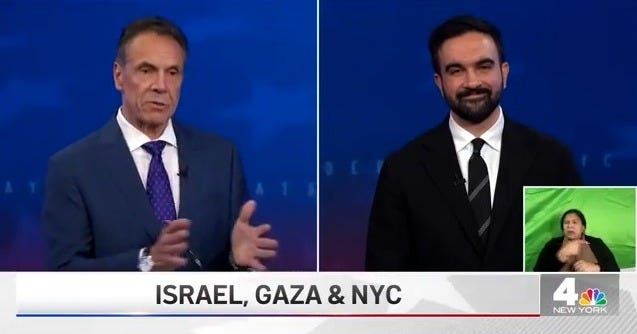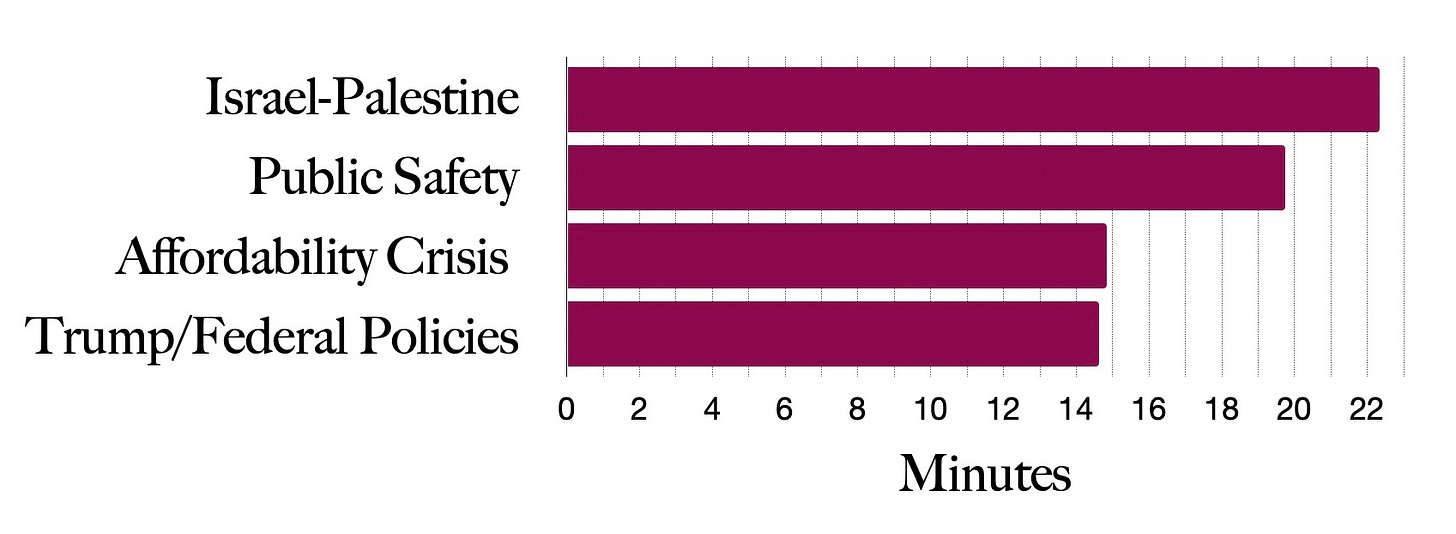Welcome to Debate Night in Tel Aviv — Ahem, New York City
More than 18% of the debate focused on Israel-Palestine, leaving less time to address the city’s affordability crisis.
The first of two debates for the election for mayor of Tel Aviv took place Thursday night. Excuse me — New York City. Well, you’d certainly be forgiven for thinking it was the former. Israel-Palestine — and when I say Israel-Palestine, I mean, “Why won’t you condemn Hamas?” — dominated the two-hour debate. Issues more relevant to working New Yorkers, like the affordability crisis, received secondary billing.
With only two weeks until the general election, the race has narrowed to Zohran Mamdani, Andrew Cuomo, running as an independent, and Republican candidate Curtis Sliwa. (If you’re not familiar with Sliwa and wondering about the gradient shading across his forehead, it’s a tan line from the self-proclaimed “iconic” red beret he’s been wearing for the last several decades.)
The debate opened strong with both Cuomo and Sliwa demonstrating that they had no idea how headlines work, and by 17 minutes in, they hit their most discussed topic: Israel-Palestine.
Despite the moderator beginning this segment by acknowledging that “of course, the mayor has no direct role in foreign affairs,” this block lasted roughly 13 minutes — leading the segment on education, which lasted just over 10 minutes. Surprisingly, crime and the NYPD was the third longest block at under nine minutes.
Other issues, which again have direct impact on the daily lives and futures of working New Yorkers — like the cost of groceries, housing, and child care — received far less than their fair share of airtime. The longest segment on the affordability crisis, at six and a half minutes, was of the “but, how will you pay for it, idiot?” variety. Cuomo did not offer up any policy proposals of his own to address working class discontent.
This did not go unnoticed by Zohran who remarked:
“I just have to say, it’s been an hour and 20 minutes of this debate and we haven’t heard Governor Cuomo say the word affordability. That’s why he lost the primary. That’s why he’ll lose the general election.”
Climate change — yes, this is a local issue; think flooding, storms and heat waves — via enforcing Local Law 97, New York City’s flagship climate legislation, received two and a half minutes of airtime. (That’s less time than Cuomo spent insisting that Zohran’s real objective is “legalizing prostitution.”)
Functionally, this segment on Israel-Palestine amounted to little more than a series of gotcha questions aimed at Zohran. In addition to the “Israel-Hamas peace deal” (a peace deal characterized by continued Israeli airstrikes), Zohran was prompted to explain “confusing” remarks he made on Fox News in which he refused to say explicitly that Hamas should lay down its arms.
On Wednesday, Zohran said:
“I don’t really have opinions about the future of Hamas and Israel beyond the question of justice and safety and the fact that anything has to abide by international law, and that applies to Hamas, and that applies to the Israeli military.”
He amended this statement on the debate stage:
“Of course I believe that they should lay down their arms. I’m proud to be one of the first elected officials in the state who called for a ceasefire. And calling for a ceasefire means ceasing fire. That means all parties have to cease fire and put down their weapons.
“And the reason that we call for that is not only for the end of the genocide, but also unimpeded access of humanitarian aid. I, like many New Yorkers, am hopeful that this ceasefire will hold. I’m hopeful that it is durable. I’m hopeful that it is just. And for it to be just, we also have to ensure that it addresses the conditions that preceded these conditions, like occupation, like the siege, and apartheid.”
Cuomo was not asked in turn whether Israel should be prosecuted for continued crimes against humanity; whether he would arrest Netanyahu if he returned to New York City under charges of war crimes by the International Criminal Court; or about his own cozy relationship with Netanyahu as part of his legal defense against those charges.
Instead of engaging with Zohran’s call for “unimpeded access” to humanitarian aid in Gaza, we got this:
“The assemblyman will not denounce Hamas. The assemblyman will not denounce Hasan Piker, who said America deserved 9/11. The assemblyman just said in his response, well, it depends on occupation. That is code meaning that Israel does not have a right to exist as a Jewish state, which he has never acknowledged. That is ‘from the river to the sea.’ That’s why he won’t denounce ‘globalize the intifada,’ which means ‘kill all Jews.’”
Clearly, Cuomo still sees painting Zohran as an untenably radical leftist as his best chance at unseating the frontrunner.
Rather than forcing Cuomo to defend his record of support for a genocide or the false assertion that “globalize the intifada” means “kill all Jews,” Zohran was pushed into a defensive posture over a record of support for the most basic human rights. Though, this should come as no surprise after watching mainstream media assist in manufacturing consent for this genocide over the last two years.
We can take this tally further, too. Policing protests — in direct reference to Zohran’s participation in pro-Palestine protests that have shut down Grand Central — and free speech rights were prodded along the Israel-Palestine thread. If we add up the amount of time spent on issues related to Israel-Palestine, that’s close to 21 minutes. If we include one question asking whether candidates would boycott any parades — likely in reference to the “Israel Day on Fifth” parade — that bumps it up to 22 and a half minutes, or 18.5% of the debate. (Sliwa was adamant that “all parades have the right to exist in New York City” and attending as many as possible would be a priority of his mayoralty — presumably wearing a sash and a top hat at all times.)
Public safety issues — including four and a half minutes on whether Zohran wants to legalize prostitution — came in second at around 19 and a half minutes. Critically, less than fifteen minutes of the debate was spent on the affordability crisis. This total includes that six and a half minutes spent answering how New York City — the wealthiest city in the U.S. — could possibly find the money to pay for Zohran’s policies. The rest of the conversation on affordability included six minutes on housing and less than two minutes on wealth inequality (all of which was Zohran). Trump and his policies — like ICE and the presence of National Guard in the city — received 14 and a half minutes.
Israel-Palestine is one of the seminal international and domestic political issues of our time. Banishing it from the electoral discourse is neither desirable nor practical — especially when it’s been a critical point of contention throughout the campaign. But the way these questions are framed and engaged with here — as a discursive trap for Mamdani and an opportunity for Cuomo to reassure voters beyond his record that he won’t rock the boat or deviate from the status quo — is morally reprehensible.
There’s a place for talking about protests and anti-Semitism in the city (though it should be abundantly clear by now that fears of anti-Semitism have been used as a sinister ploy to restrict free speech and demonize the left). These are real issues relevant to New Yorkers.
But while 18.5% of the New York City mayoral debate was spent re-litigating who’s for a free Palestine and who’s wrong, New Yorkers were robbed of an opportunity to hear how Cuomo (and Sliwa, lest we forget him) plan to respond to the affordability crisis. It bears repeating that the affordability crisis, and a slate of policies aimed at alleviating the burden on the working class in this city, is what got Zohran on that debate stage — not his social media game, as Cuomo seemed to indicate. Never mind that this verbal song-and-dance grotesquely reduces the entire conflict — a genocide that has killed at least 67,000 people — to a rhetorical ambush.
Because of the myopic focus on getting Zohran to defend his record of solidarity with Palestine, civil disobedience, support for the working class, and to condemn Hamas, Cuomo was able to obscure his lack of material policy ambitions. (Informing those of us under 40 what he did when we were five doesn’t count either.) Cuomo’s plan — if through some catastrophe he wound up in Gracie Mansion — seems to be mayor only for those who support him: Bill Ackman and the rest of the donor class.
So what did we actually learn from this debate? Aside from that Sliwa was apparently “shot in the back of a yellow cab in 1992 by the Gottis and the Gambinos,” a whole lot of nothing — besides that a Zohran Mamdani mayoralty looks more and more inevitable.
Bowed Press is just getting started — and we need your help. Please consider supporting our work covering labor, climate, and what matters to working people by becoming a founding member below.




